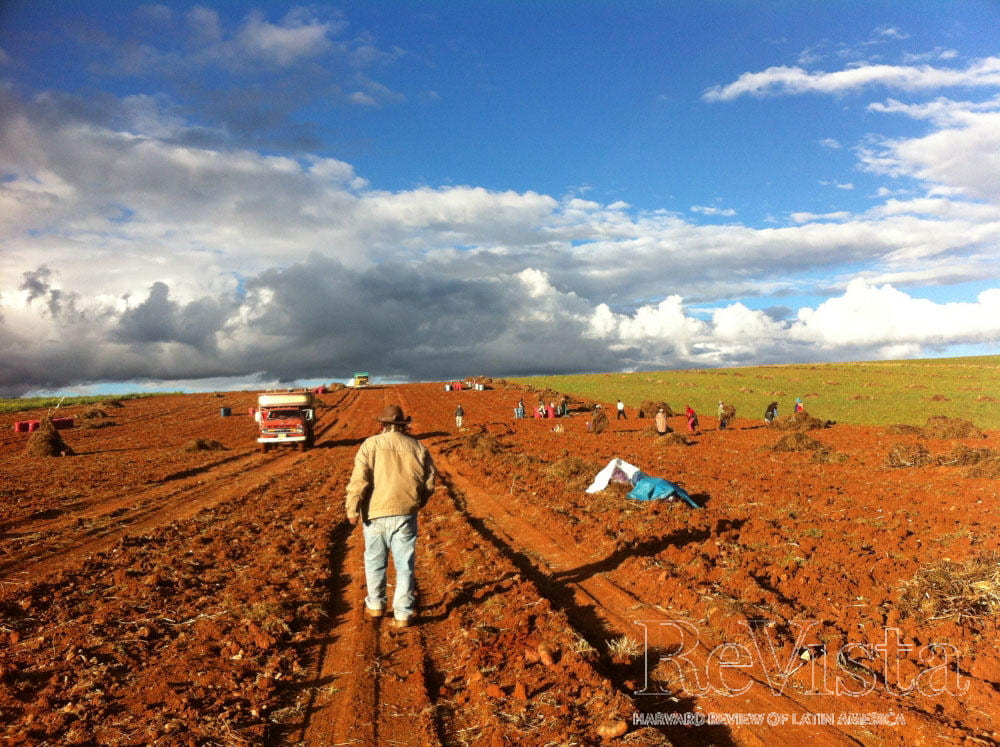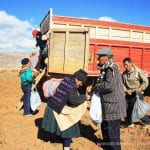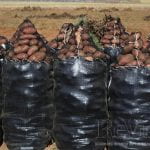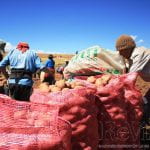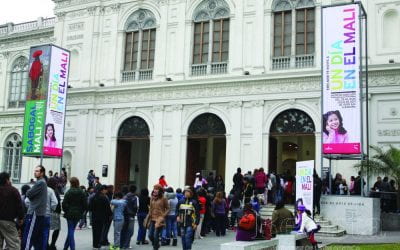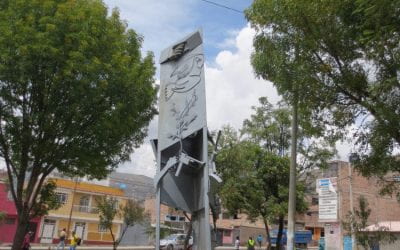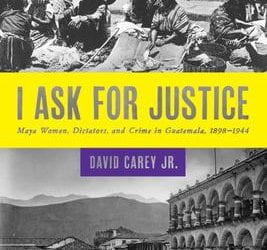Potatoes!
Searching for Family Roots in the Peruvian Andes
- The author’s grandfather distributes coca leaves among the workers. Photo by Tilsa Ponce.
- 22 potatoes ready to go to the wholesale market in Lima.
- Workers pile potatoes. Photo by Tilsa Ponce.
We Peruvians love potatoes. Not only because we can claim the origins of the tuber here in the Andes, and because we have more than 2,000 varieties, but also because they are part of our daily lives —and tables. The Peruvian gastronomic boom of the last few years has highlighted local ingredients that make our food so delicious—including native potatoes. But along with the attention that these tubers have received, we have forgotten about the most ordinary varieties of potatoes: those white potatoes we use to make the French fries we eat with the very famous pollo a la brasa (Peruvian rotisserie chicken). Those are the ones that concern me in this text and in my dissertation explorations in the Central Andes.
It’s harvest time in the Peruvian Central Highlands and the small city of Jauja looks especially agitated these days. Traders from many different places come here to buy potatoes and seed potato. Drivers wait with their trucks to receive orders to bring loads of potatoes to Lima or elsewhere. Every morning, while I walk with my abuelito on the streets of Jauja, we run into people who respectfully greet him and ask what he is harvesting. Knowing his produce is well valued, he is sometimes elusive and doesn’t want to give too much information. He knows he really doesn’t need to advertise his potatoes. People often offer him advance cash to make sure he sells them his produce, and he usually replies: “We’ll see when I have the potatoes.”
Edwin is buying seed potatoes for his sister who has lands in Huanuco, a city in the way to the Amazon. He is in Jauja only for a few days; his stall in the Wholesale Market in Santa Anita, Lima, cannot be left abandoned for too long. Enrique comes to the chacra (the fields) to check out the seed potatoes and hopes my abuelito sells him 30 tons that he will plant in a few weeks in Barranca, a northern city on the coast, a few hours from Lima. Don Manuel has some lands in the Mantaro Valley but also buys potatoes that his daughter sells in Iquitos, the main city in the Amazon. Potatoes take around eight days—by roads and river—to get to their final destination. A fellow nicknamed Loro (parrot) works as an intermediary; he introduces potential buyers to my abuelito and makes sure the transaction is successful. He also receives specific requests of seed potatoes and goes over the chacras on his motorcycle to fulfill them.
Nati has been working with my abuelito for more than forty years, ever since she came from Huancavelica with her family; all of her seven children have grown up at the chacra. She knows potatoes as no one else does and my abuelito trusts her to keep an eye on the other workers. While chewing coca leaves, she tells me old and new gossip about my relatives, stories about potatoes, and explains how to protect myself from strange characters that appear during the night. Maxi—who has a swindler’s smile—jokes with me in Quechua, asking me to steal some coca leaves from my abuelito for her; she also tells him that she will no longer come to work with him if he keeps being so grumpy. Viviana is younger and more quiet, she has two girls and her own lands that her husband works; their main crop is passion fruit. Olga, Viviana’s cousin, has become one of my best friends at the chacra; she is always smiling and ready to make jokes. Sometimes she decides to speak to me exclusively in Quechua, and laughs at me when I don’t understand what she says, but later explains what she has said. Her Wanka Quechua is different from the one I learned a few years ago in the southern Andes.
I’ve been living in Huancayo—the main city in the Peruvian Central Highlands, 45 minutes from Jauja—for the past six months, doing dissertation fieldwork. But unlike most of the anthropologists, for whom doing fieldwork means learning a different language and facing the challenge of being away from home, for me fieldwork has meant returning home. Well, not exactly. Although both of my parents were born in the Central Highlands, they left for Lima to start college and established their lives in the capital city. A few months ago, I decided to come back where I had never lived before. Coming back was a symbolic return more than a real one. My academic interests were tied together with the exploration of my family history and my abuelito would be one of the main characters in my dissertation story.
Although quinoa has replaced potatoes in a lot of fields in the region, the latter is still the main crop. However, these are not the same potatoes my abuelito sowed when he first started working in the fields. In 1954, my abuelito and his brother decided to rent some lands, buy some seed potatoes and start planting them for commercial purposes. They were not the only ones with such ideas. Along with them, other people also decided to embark in the venture of leaving their status as peasants to become commercial farmers. Things were not easy, but their hard work, the introduction of improved potato varieties, the increased demand in the demographically growing cities, among other factors, helped them to succeed in their venture and consolidate their development as commercial farmers. Now the improved potato varieties are the most common in Jauja: they are more resistant to plagues, produce up to 35 or 40 tons per hectare and fulfill the large demand of restaurants in Lima and elsewhere.
Living together with my abuelito is not always easy; he’s often impatient and grumpy. And although I learn with him everyday, sometimes he just cannot understand how his urban granddaughter doesn’t understand too much about agriculture. Seated on a side of the chacra, his wrinkled and shabby hands—toilers for so many years spent in the fields—dig the soil and find some potatoes that he groups by size and quality. While doing so, he explains to me how to categorize them and shows me how some of them have been attacked by plagues, despite the pesticides he has used. “At least the harvest this year seems to be better than the last one,” he says, while burying the potatoes back under the soil.
It’s late May and the rainy season doesn’t seem to end yet. Farmers complain because humidity isn’t good for potatoes anymore and the rain doesn’t allow the tubers to dry. I’m also worried about my abuelito getting wet and sick with this weather. But I’ve also learned that it is often useless to try to convince him to change his daily routine, even though some days he wakes up very tired and doesn’t feel like going to work. And of course he’s tired; it’s now more than sixty years that he has been working the fields, sowing potatoes. But once he is in Jauja looking at his beautiful chacras, his fatigue seems to disappear and being 87 years old doesn’t seem to be an impediment to continue doing what he has always done.
Fall 2014, Volume XIV, Number 1
Tilsa Ponce is a Ph.D. candidate in the Anthropology Department at Harvard University. She is currently living in Huancayo, where she is doing fieldwork for her dissertation on potato farmers, social mobility and social change in the Peruvian Central Highlands since the 1950s.
Related Articles
The Violence of the VIP Boxes
English + Español
In Peru, the upper class does not like to mix with those they consider different or inferior. Their maids on the beaches south of Lima are not allowed to swim in club pools and, sometimes, not even in the ocean. The VIP boxes at sports and theater events maintained by the government are a public display of a private practice that reproduces in the public sphere the worst aspect of private hierarchical structuring.
Peace and Reconciliation
English + Español
Eleven years have gone by since the Peruvian Truth and Reconciliation Commission presented its final report. The report reconstructed the history of many cases of massacres, tortures, murders and other serious crimes. At the same time, it contributed an interpretation of the…
I Ask for Justice: Maya Women, Dictators, and Crime in Guatemala, 1898–1944
On May 10, 2013, General Efraín Ríos Montt sat before a packed courtroom in Guatemala City listening to a three-judge panel convict him of genocide and crimes against humanity. The conviction, which mandated an 80-year prison sentence for the octogenarian, followed five weeks of hearings that included testimony by more than 90 survivors from the Ixil region of the department of El Quiché, experts from a range of academic fields, and military officials.

